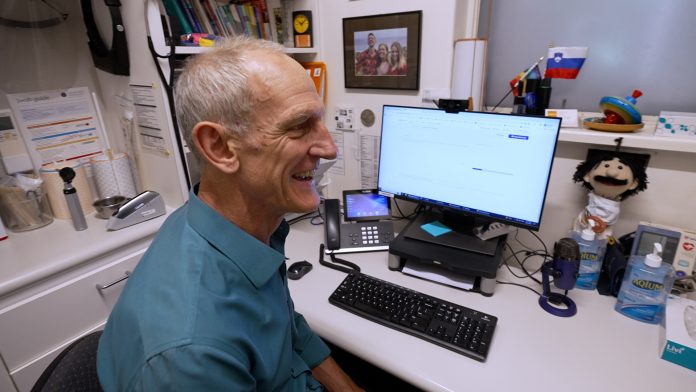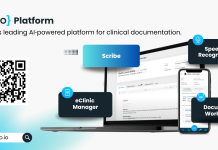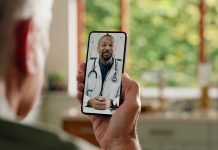Kai Van Lieshout discusses how AI scribes are transforming clinical practice, presenting both human stories and empirical evidence to show their impact on medical practitioners and the patient experience
The relentless administrative burden on healthcare professionals is a crisis that threatens to pull them away from the very reason they entered the profession: their patients. Every hour spent on clinical documentation after a long day of consultations contributes to burnout and delays care for those on long waitlists. With specialists like paediatricians taking over a decade to train, we can’t simply hire our way out of this problem. We need a better solution to save time.
This is where AI scribes are proving to be a transformative force, not just by automating note-taking, but by fundamentally improving the quality of patient care and restoring the professional lives of clinicians.
The human impact: A doctor’s story
Dr Jo Martin, a highly experienced paediatrician who opened her own multi-disciplinary practice, Ascot Vale Paediatrics, understands this challenge intimately. Seeing up to 20 patients a day with complex needs, her administrative load was “really taking its toll.” Her waitlist is six months, which she considers short compared to her peers, and she feels a deep responsibility to fit in children with serious medical problems.
When a colleague introduced her to Lyrebird Health, she immediately knew it was a “game changer.” Lyrebird Health provides an AI scribe for medical practitioners that securely listens throughout a consultation and intelligently generates a note tailored to a clinician’s style. The software freed her from two hours of late-night notes, which she credits with having “changed my enjoyment of my work as well.”
The impact on Dr Martin’s clinical interactions has been equally profound. With the AI scribe silently handling the documentation, she no longer needs to type during consultations. This has taken a significant cognitive load off her shoulders and allows her to be more present with her patients. For children, she can now play with them to build rapport, and with adolescents, she can build trust by doing a puzzle with them while listening deeply.
The patient experience has also been enhanced. Dr Martin can now send detailed letters to families after every consultation, which contain a level of detail that was previously not possible. She tells parents that all the follow-up tasks will be in a letter when they leave, allowing them to “take a breath and listen to me more” during the consultation.
The empirical evidence: Data that supports the impact
Dr Martin’s experience is not an isolated one; it is supported by a growing body of empirical evidence. Studies have shown that using an AI scribe significantly reduces the time allied health professionals (AHPs) spend on notes and letters, as well as the frequency with which they complete notes outside of work hours. This reduction in administrative burden has a direct impact on the bottom line, with one study finding that productivity increased by an average of 5.8%. The positive effects extend to professional wellbeing, with 29% of AHPs agreeing or strongly agreeing that the scribe improved their job satisfaction.
The benefits also extend to the patient- clinician relationship. Patients reported that the AI scribe allowed the clinician to maintain eye contact and have a better flow of conversation, making them feel “more heard and engaged.” This led to a positive impact on the therapeutic alliance from both the clinician’s and patient’s perspectives. The majority of patients were comfortable with the use of the AI scribe and trusted their clinician.
When it comes to the quality of documentation, AI scribes consistently outperform human-written notes. Two separate studies evaluating note quality using the Physician Documentation Quality Instrument (PDQI-9) found that AI-generated notes scored higher on average. In one study, notes generated by the Lyrebird scribe scored an average of 37.1 out of 40, compared to the clinicians’ notes, which scored 34.6 out of 40. Another study found that AI scribes scored between 40 and 44 out of 45, while clinician notes scored 37 out of 45. These findings suggest that AI scribes produce a higher quality of notes, potentially leading to better patient outcomes.
Validating the technology: The Alder Hey Children’s NHS Foundation Trust
Lyrebird is proud to partner with the Alder Hey Children’s NHS Foundation Trust, a collaboration that represents an “exciting step toward a future where technology empowers healthcare professionals to deliver even better care.”
Research conducted by Alder Hey found that AI-generated clinic letters for complex paediatric neurosurgery patients were preferred by clinicians in 85% of cases. The AI-generated letters also showed a significant improvement in readability scores while still maintaining factual accuracy. These findings demonstrate that AI can seamlessly incorporate information from multiple clinicians into a single, comprehensive letter, validating the technology in complex, multi-clinician clinics.
A path to adoption: Practical guidance for clinicians
For practices considering AI technology, the advice is to start small by implementing one tool at a time to avoid overwhelming change. It’s also recommended to try before you buy by using free demos to ensure the tool meets your specific needs. Dr Martin offers some simple but powerful advice for hesitant peers: “Do it for two weeks alongside what you’re doing and just have it,” and see the benefits for themselves.
To experience this transformative technology for yourself, Lyrebird Health offers a free 14-day trial. It’s a small investment that, as Dr Martin says, can truly change your life and deliver a better patient experience.

This work is licensed under Creative Commons Attribution-NonCommercial-NoDerivatives 4.0 International.











